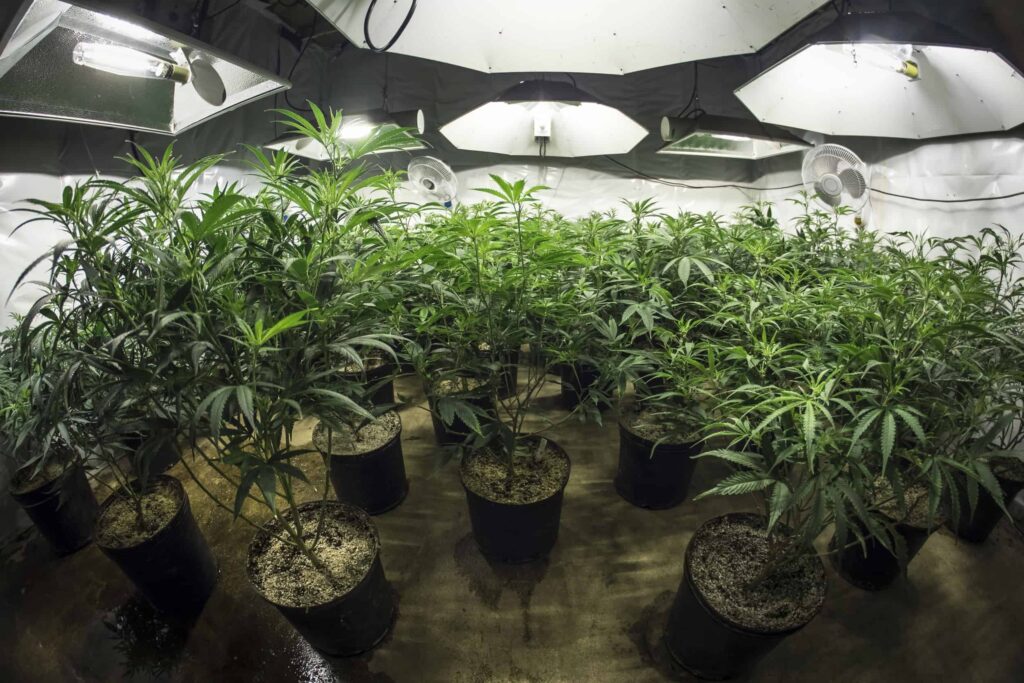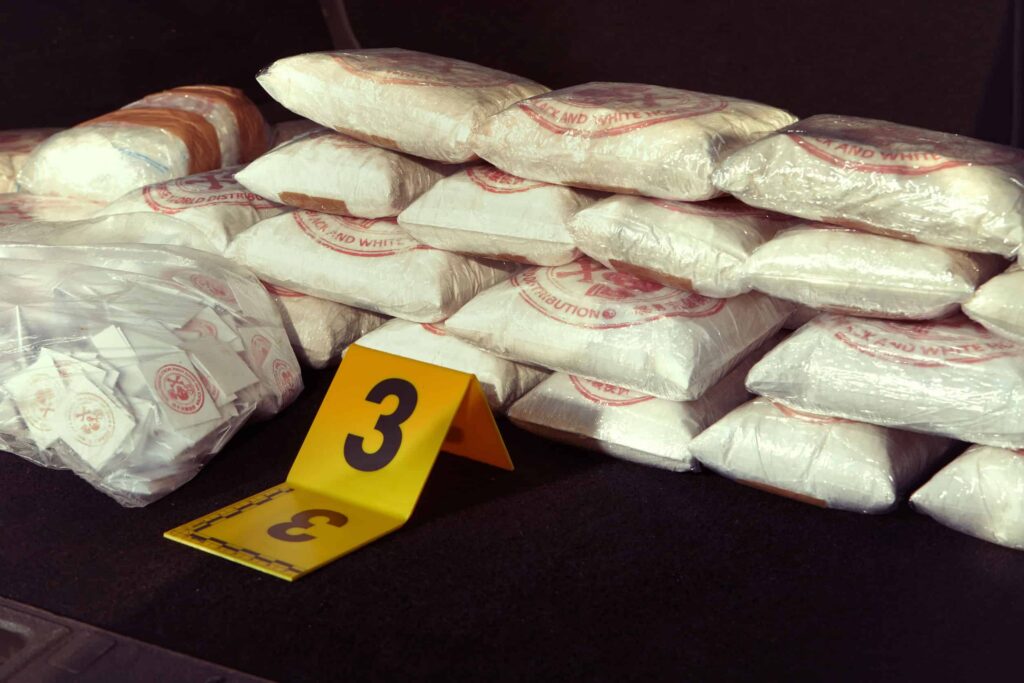Defending Against Police Informant Testimony
April 18, 2025

Everything You Need to Know about Colorado Credit Card Fraud
Do You Have a Colorado Criminal Record?
Posted by: Jacob E. Martinez
Category: Drug Trafficking
In the context of illegal drugs, “trafficking” refers to the act of moving large quantities of drugs for distribution, often involving multiple states and/or international transactions. Generally speaking, drug trafficking crimes are covered by both federal and state law. While most states have no specific charge for drug trafficking, in Colorado, charges and penalties for distributing illicit drugs are based primarily on the type of drug and the amount being trafficked.
The selling or distributing greater than 112 grams of meth or heroin in this state, for instance, can result in a prison sentence of up to 32 years if convicted. On the other hand, a conviction for distributing exactly the same amount of an anabolic steroid will amount to six years in prison, max.
Although this may change, with the legalization of marijuana we’ve obviously seen a decline in the prosecution of trafficking of this drug at the state level. However, when it comes to trafficking legally grown marijuana to other states, Colorado law makes it clear that once it crosses state borders, it is no longer considered legal. Typically, though, it is the authorities in the destination states that will file charges of possession or possession with the intent to sell.
So, when do state trafficking charges cross over into federal crimes?
Technically, federal prosecutors can involve themselves in any case of drug trafficking they wish. However, in most cases prosecuted at a federal level, the defendant has moved drugs across state lines.
Let’s look at this a bit more in-depth.
Simply put, the feds are more likely to take up an investigation or collaborate with local law enforcement agencies when they suspect multiple states are a part of the same organization.
Why?
Because there are only 24 hours in a day, and investigations are often an incredibly lengthy process. In order for federal prosecutors to spend their efforts and resources most efficiently, they oftentimes leave the small-scale dealings to the state, holding out for larger trafficking busts like the Meth ring bust last May.
Even though marijuana was only legalized here a few years ago, it has already had a huge impact on the state. In a recent op-ed, Denver-based DA Bob Troyer expressed his concerns about the effects of running headlong into marijuana commercialization – Colorado youth use marijuana at a rate 85% higher than the national average, marijuana trafficking fatalities are up by 151%, and indoor marijuana growing consumes 17 times more power per square foot than the average residence, to name a few.
This is because while the attorney general sets national priorities, district attorneys have near-complete autonomy in deciding where to focus their efforts, and priorities differ depending on region. The amount of effort each DA plans to put into national goals and what crimes to concentrate on prosecuting in their districts is based on specific public safety challenges in their region first, and the national priorities set by the attorney general second.
For example, while the US attorney’s office overseeing southern California’s federal district took on 98% of the drug trafficking complaints presented over the last decade, US attorneys based in Toledo only prosecuted about a quarter of the cases that crossed their desks during the same period.
Because of the concerns expressed by DA Troyer, we may see an uptick in federal interest on marijuana trafficking crimes here in the near future.
Another major contributing factor to whether Colorado drug trafficking charges will be handled at the state or federal level is public interest.
The CDC reports around 68% of drug overdoses in 2017 involved an opioid, and that an average of 130 Americans dies each day from them, making the opioid epidemic a current social hot button across the country. Common opioids associated with the national issue include Codeine, Hydrocodone, Morphine, Oxycodone, Hydromorephone, and Fentanyl.
As a result, when federal investigators see any of these drugs moving in large quantities right now, they tend to look into the criminal activity.
In sum, when you ask the when you ask what determines whether a trafficking case will be handled federally or at the state level, it often comes down to: is it seen as big enough, important enough, and impactful enough for the feds to dedicate time to it. Which means it’s a moving target, and something that was a state trafficking case five years ago might become a federal one today – or vice versa.
That being said, typically small-scale trafficking that stays within the state and isn’t connected to the current major concerns of whoever is the US district attorney is likely to be charged as a Colorado state crime rather than a federal one.
About the Author:
Denver-based criminal defense and DUI attorney Jacob E. Martinez is a knowledgeable and experienced litigator with a record of success providing innovative solutions to clients facing criminal charges of any severity. Mr. Martinez has been designated a Top 100 Trial Lawyer by the National Trial Lawyers and has been awarded both the Avvo Client’s Choice Award and Avvo Top Attorney designation, evidencing his reputation for his exemplary criminal and DUI defense work and high moral standards.
Jury Trial - Not Guilty
Jury Trial - Not Guilty
Arapahoe 1st Degree Assault/Vehicular Assault
Jury Trial - Not Guilty
Denver Domestic Violence Assault Case
Jury Trial - Not Guilty
Denver D.V. Assault
Jury Trial - Not Guilty
Denver Careless Driving Resulting in Death
Jury Trial - Not Guilty
Jefferson County Felony Menacing
Jury Trial - Not Guilty
Adams County DUI
Jury Trial - Not Guilty
Jefferson County DUI
Jury Trial - Not Guilty
Jefferson County DUI
Jury Trial - Not Guilty
Jefferson Vehicular Assault/DUI
Jury Trial - Not Guilty
Jefferson County DUI
Jury Trial - Not Guilty
Boulder County DUI case
Jury Trial - Not Guilty
Arapahoe County DUI case
Jury Trial - Not Guilty
Adams County DUI case
Jury Trial - Not Guilty
Douglas County DUI case
Jury Trial - Not Guilty
Gilpin County DUI case
Dismissed
Broomfield County Probation Revocation case
Dismissal
Arapahoe County DUI case
Deferred Judgment
Arapahoe County DUI case
Deferred Judgment
Douglas County DUI case
Deferred Judgment
Larimer County DUI case
Deferred Judgment
Arapahoe County DUI Case
Deferred Judgment
Denver Felony Burglary Case
Deferred Judgment
Arapahoe County DUI case
Dismissed
Arapahoe County Protection Order Case
Dismissed
Golden Destruction of Property case
Dismissed
Jefferson County Protection Order case
Dismissed
Jefferson County Domestic Violence case
Dismissed and Sealed
Jefferson County DUI case
Dismissed
Denver Major Traffic Offense case
Dismissed and Sealed
Broomfield County Domestic Violence case
Dismissed
Summit County DUI Revocation
Dismissed
Denver DUI Revocation
Dismissed
Denver DUI Revocation
Dismissed
Denver DUI +.2 Involving Accident and Injury case
Dismissed
Denver DUI/Habitual Traffic Offender case
DISMISSAL
Denver District Aggravated Theft
Dismissed
Greenwood Village Assault case
Dismissal
Elbert County DUI
Dismissed
Arapahoe County Domestic Violence case
Dismissal
Jefferson County DUI
Dismissal
Denver Municipal Assault
Dismissed
Boulder County Domestic Violence Assault case
Dismissed
Wheat Ridge Assault case
Dismissed
Jefferson County DUI case, with 2+ Prior Convictions
Dismissed
Arapahoe County Domestic Violence case
Dismissed
Broomfield County Domestic Violence case
Dismissed with No Charges Filed
Jefferson County Felony Theft case
Dismissed
Arapahoe County Felony Theft case
Dismissed
Boulder County Felony Theft case


